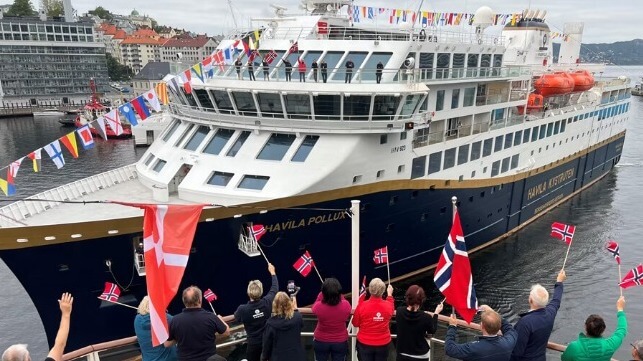Havila Finally Launches Norwegian Coastal Service with Two Delayed Ships

Norway’s Havila Kystruten marked key milestones in its long-delayed efforts to complete the launch of its Norwegian coastal service. After more than 15 months, the company was able to complete the process to extradite its fleet from the sanctions imposed on its original lender, Russian financial institution GTLK, and this week the last two ships of its fleet arrived in Norway. Tonight, August 18, the first of the two ships entered service with her sister ship becoming the fourth and final ship to begin service with its maiden voyage set for August 23.
Less than three days after arriving in Bergen from the voyage from the Tersan shipyard in Turkey, Havila Polaris departed on an abbreviated itinerary due to a longer-than-anticipated delivery voyage due to bad weather and a refueling stop in Spain. The ship departed from Bergen with passengers that had been booked for the August 17 maiden voyage, and she will go directly to Bodø where she will commence the normal route starting on Sunday, August 20.
The ship arrived in Bergen on August 15 after being handed over in Turkey on August 1, several months after her originally anticipated delivery. She departed for the delivery trip three days later on August 3, with the company highlighting that over the past few days, several hundred people have been working to prepare the ship for operation along the Norwegian coast. The crew of the vessel was joined by the crew of her sister ship Havila Pollux which arrived in Bergen yesterday, August 17, as well as shore personnel and off-duty crew all pitching in to get the ship ready. It also had to complete an LNG refueling before departing.
“It is wonderful to see our two latest vessels side by side here in Bergen, and crews from both ships along with many resources from our onshore organization are fully engaged in preparing them for operation along the coast,” said CEO Bent Martini. “It's very satisfying that we now have all our four vessels in Norway.”
The fourth ship, Havila Pollux, had originally been scheduled for delivery in December 2022, but has additional time to prepare for its maiden voyage with is set for next Wednesday. With that, the company will have completed its introduction with the last two ships having waited while the company completed refinancing and gaining release agreements from the courts in the UK and Ireland.
“The Ministry of Transport, our contracting authority, has fortunately supported us throughout a complex process and demonstrated great understanding of the challenges we've faced, which unfortunately resulted in significant delays. We are grateful for that support," said Martini.
In addition to winning the court approvals to establish frozen accounts that were used to pay off the original loans from GTLK, the company was required to refinance. Each of Havila Voyage’s ships is valued at approximately 150 million euros, and the shipping company financed the fleet by raising 305 million euros from the investment firm HPS Investment Partners. Additionally, the largest owners and investors of the shipping company have raised 65 million euros in additional equity, and Havila Holding has contributed a loan of 20 million euros.
Like the first two ships of the fleet, Havila Capella and Havila Castor, which entered service earlier in 2022, Havila Polaris and Havila Pollux (15,800 gross tons) have energy-efficient hull designs created to handle the varied conditions along the Norwegian coast. The ships are equipped with a battery pack of 6.1 megawatt-hours (MWh), allowing them to operate emission-free for up to four hours. The ships' propulsion is a hybrid solution, with a combination of the 86-ton battery packs and liquefied natural gas (LNG) providing the power. The battery packs can be charged while the ships are docked. In addition to reduced emissions, some of the ships' features include heat recovery from sea and cooling water to warm up the ships and the water on board.

that matters most
Get the latest maritime news delivered to your inbox daily.
"We have the capability to operate in a carbon-neutral way today by using biogas as fuel in combination with the battery packs,” highlights Martini. “It's a matter of access and cost, and now that we have finally completed a complicated refinancing, we can focus on finding a solution for transitioning to biogas."
The four ships operate under contract with the Norwegian government to maintain the coastal service from Bergen to Kirkenes. The government chose to split the contract between Havila and Hurtigruten to create more options and competition. In addition to 12-day round-trips sold as cruises, the ships provide point-to-point transport and have the ability to carry cars along the coastal route.
